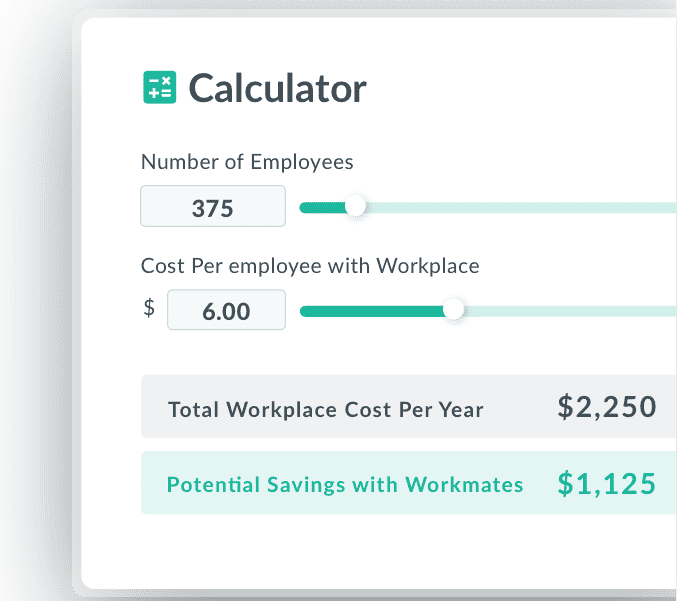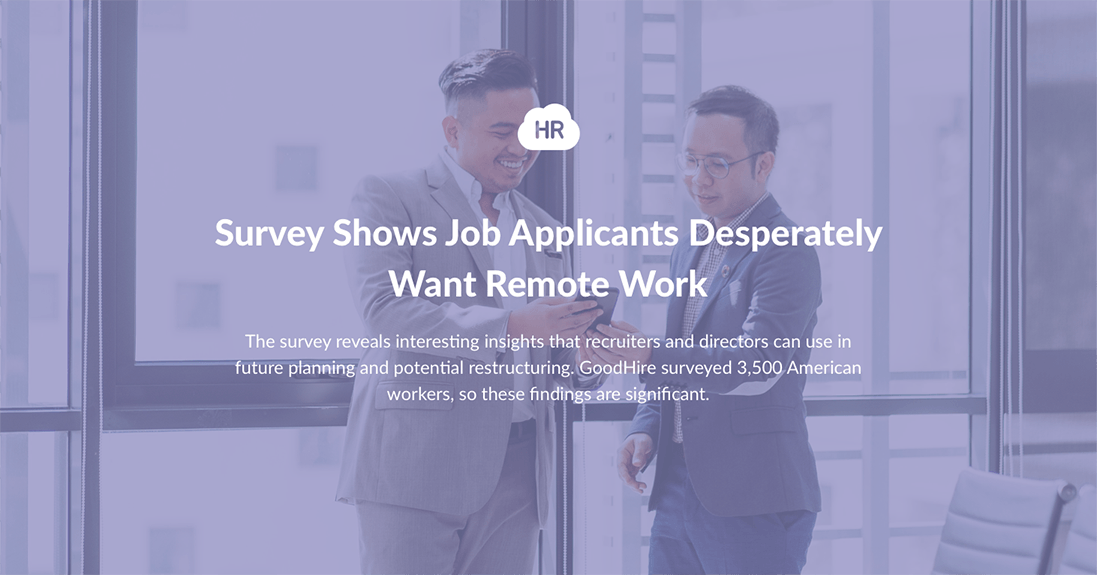Survey Shows Job Applicants Desperately Want Remote Work
A survey by GoodHire raises questions about the future of recruitment and human resources. The COVID-19 pandemic understandably plays a part in the findings. The pandemic has given workers a taste of remote work and the perks that come with it. The survey reveals interesting insights that recruiters and directors can use in future planning and potential restructuring. GoodHire surveyed 3,500 American workers, so these findings are significant.
The Changing Views of Workers
The survey found that the views of workers regarding office work are changing. Just under 70% of respondents stated that they'd choose a remote working position over an in-office one. The respondents also believed that most people in the US now prefer remote working. This is understandable when you consider that 60% of those surveyed said they'd move to a different city to take up a remote working position.
Find Out How Much You Can Save by Switching to Workmates.
and save upwards of 60%

Employee Views on COVID-19 Workplace Safety
COVID-19 will be with us for some time. It will not go away soon, and we must adjust to living alongside it for the foreseeable future. Although vaccinations are becoming increasingly available and overall deaths from the virus are reducing, safety is still a priority. Remote working is evidently safer than working in an office environment. Therefore, it's easy to see why workers may be reluctant to return to a more "traditional" working environment.
More than half of the survey respondents said they had safety concerns over returning to the workplace. Eighty-four percent said they wanted efforts regarding COVID-19 safety to increase. This includes wanting workers to wear masks in the office, all employees to have proof of vaccination before returning, and reducing the number of people in the office at one time. Even with these precautions in place, working remotely is still significantly safer.
Life After COVID-19
Although COVID-19 isn't going anywhere soon, there will come a time where we consider the virus to be much less of a threat. However, it's important to remember that the safety benefits of remote work regarding COVID-19 aren't the only reason people prefer working away from the office. We have given workers freedom that many haven't experienced before. They have had autonomy and the perks that come with working from home.
Many people want to continue remote work when the pandemic is "over." The GoodHire survey found that 85% of job seekers prefer vacancies with flexible and remote working options. It's clear that the pandemic has shifted views and working habits, and it is likely that many job seekers will look only for remote options in the future.
Understanding the Desire to Work Remotely
It's important to understand the desire many people have to work remotely and the lack of desire to spend more time in the office. This working style for remote employees is very new to many people and gives them a greater sense of control and freedom over their work. Commuting costs workers a considerable amount of time and money; with remote work, they eradicate this.
Some workers may feel more comfortable working remotely, especially if they suffer from mental health problems. Childcare can be a huge issue for many parents; working remotely can help with this. Similarly, some people may have felt they could not have a pet in the past because of the time they spent outside of the house.
Recruiters will need to consider why workers have a desire to work from home. They may also need to make changes to accommodate this. The findings from the GoodHire survey illustrate a strong desire to work remotely from the majority of respondents.
The Payoff for Remote Work
The desire to work remotely is so strong that employees will sacrifice to get it. Over 60% of workers in the survey said they'd take a pay cut to have the option to work remotely. Some workers even said they'd happily cut their pay in half if it meant they didn't have to return to the office again. However, most respondents stated that a 10% pay cut would be worth it if it meant they could work remotely.
Money isn't the only thing that workers will sacrifice for remote work either. Employee benefits were another thing that workers would happily say goodbye to if it meant they could work from home. Seventy percent of people said they'd give up their employee benefits to work remotely. This included paid time off, leisure memberships, 401K plans, and health insurance.
The pandemic has given many employees working remotely a taste of freedom that they'd literally pay for. This is something that needs to be considered by employers as they strive to provide better job satisfaction.
Potential Impact on Employers
The findings provide crucial information for employers. Attitudes are changing fast, and if recruiters don't make changes quickly enough, there could be consequences. In fact, the survey found that nearly 75% of workers would quit their jobs if their employer forced them to return to the office full-time. This statistic, combined with others found in the survey, shows how much remote working means to employees.
If employers cannot respect the voice of their workers, they may lose them. Recruiters planning to phase out working remotely are at risk of losing top talent. Workers now expect flexible options and will happily move to companies that provide these.
Consider the information about how much employees would sacrifice to have a remote role. The survey highlights the need to take seriously the opinions of workers regarding flexible working arrangements.
Employer Changes & Benefits for Employers
Changing working arrangements can seem like an intimidating prospect, but it can come with many benefits for employers. Switching to a group of remote workers can save considerable expense. As the survey showed, employees are happy to sacrifice a percentage of their pay or employee perks just to be given the option to work remotely. This alone means less expense, as does having fewer workers in the office. Some companies may even be able to downsize their offices and cut expenses by doing so. You may even slash operating costs and overhead, including utility bills.
It's crucial to remember that a happier full-time workforce means a more productive workforce. It also may mean a lower employee turnover and a better reputation for your company. Competitors will likely offer flexible working options in the future, and more technology like video calling, so taking the opportunity as soon as possible can avoid them getting ahead.
Looking Ahead
The findings from the GoodHire survey are significant and show hybrid work is hugely important. Simply ignoring these may mean that recruiters find themselves in situations where they are losing top talent or struggling to find applicants for positions. The pandemic has shifted how we think about work and the new-found hybrid work, and while most employers prefer an office-based work environment, most employees do not. Listening to employees is key to growth and continued success. It is time for recruiters to reassess the remote working options available in their workplace and make changes to improve job satisfaction among employees.
About Author: This article is written by our marketing team at HR Cloud. HR Cloud is a leading provider of HR solutions, including recruiting, onboarding, employee engagement, and intranet software. Our aim is to help your company improve employee engagement, employee productivity, and to save you valuable time!
Keep Reading
Importance of Onboarding: Purpose, Benefits, and What It Means for Your Workplace
Think about the last time you joined a new team. You had questions, maybe even doubts.
The Most Common Hiring Mistakes in the Healthcare Industry
The hiring process can be tedious in the healthcare industry, and it may be tempting to
